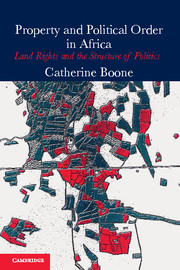Book contents
- Frontmatter
- Dedication
- Contents
- List of Figures, Tables and Maps
- Preface and Acknowledgments
- 1 Introduction
- Part I Property Rights and the Structure of Politics
- Part II
- Ethnicity
- 4 Ethnic Strangers as Second-Class Citizens
- 5 Ethnic Strangers as Protected Clients of the State
- Part III
- Part IV
- Appendix Land Politics Cases and Sources
- References
- Index
4 - Ethnic Strangers as Second-Class Citizens
Published online by Cambridge University Press: 05 June 2014
- Frontmatter
- Dedication
- Contents
- List of Figures, Tables and Maps
- Preface and Acknowledgments
- 1 Introduction
- Part I Property Rights and the Structure of Politics
- Part II
- Ethnicity
- 4 Ethnic Strangers as Second-Class Citizens
- 5 Ethnic Strangers as Protected Clients of the State
- Part III
- Part IV
- Appendix Land Politics Cases and Sources
- References
- Index
Summary
In the Senegal River valley, the local Haalpulaar (“Toucouleur”) communities have become concerned that land will not be available in sufficient amounts for their children and grandchildren. As a result, they have started closing access to the good inundable lands…located near the river for all strangers and immigrant farmers.
(Platteau 2002, 8)No matter how long one has stayed in the area, a migrant is still a migrant.
(A son-of-the-soil, western Ghana, July 2009)The customary land tenure regimes (LTRs) assign differential property rights and citizenship statuses to ethnic insiders and ethnic outsiders. These arrangements impose an ethnic status on land users and confirm hierarchy between the two groups. Where customary authorities at the local level (chiefs or lineage leaders) control land allocation and adjudication, ethnic outsiders or in-migrants are in a position of socioeconomic and political subordination. This hierarchy goes far in defining who is likely to lose land rights as land access becomes more exclusive: the customary land tenure regimes focus growing pressure on strangers. Rising demographic, environmental, and commercial pressures tend to result in the withdrawal or scaling back of in-migrants’ land access. Political rules encoded in the customary land regimes also go far in structuring the political options of those threatened with this form of exclusion. In most such situations, the local political arena offers migrants very few avenues of recourse or appeal, and only ad hoc channels of access to the national administration. The subjugating effect on in-migrants is visible not only in matters concerning land per se but also in issue areas and political dynamics that do not concern land.
- Type
- Chapter
- Information
- Property and Political Order in AfricaLand Rights and the Structure of Politics, pp. 100 - 126Publisher: Cambridge University PressPrint publication year: 2014



